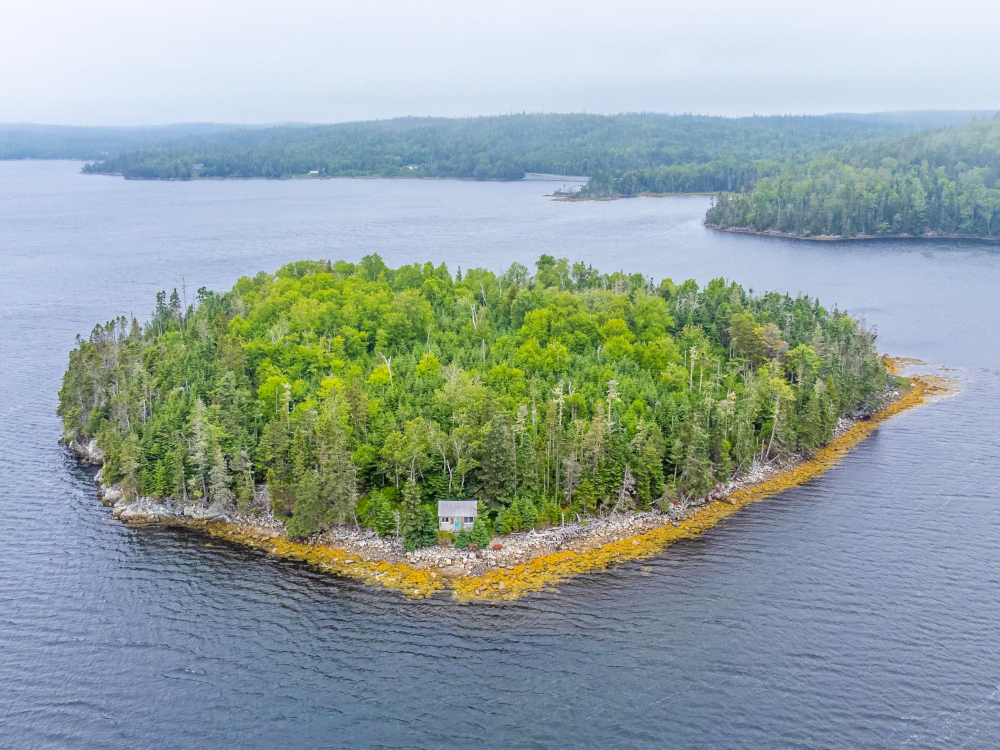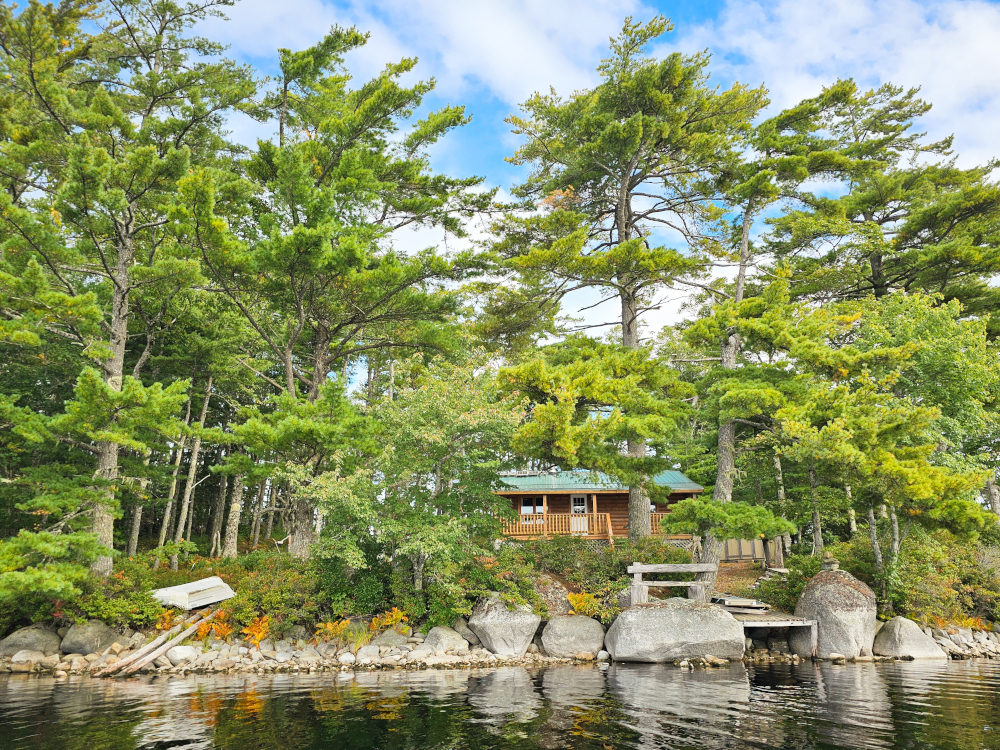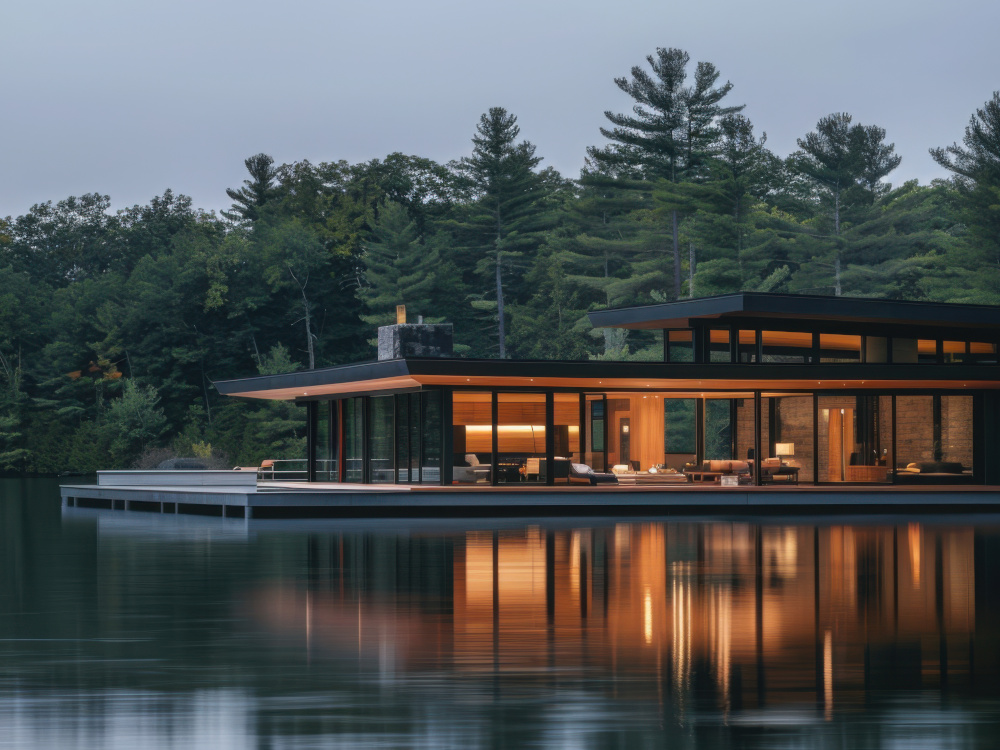On a quiet Wednesday morning in downtown Toronto, Greg Tait’s phone rang. A cottage neighbour had some bad news—and some good.
“Your bunkie’s on fire,” the neighbour said. “But the good news is, the flames didn’t spread to the trees and brush.”
After a stressful three-hour drive—and a boat ride—Tait stood near the smouldering remains of what had once been a sleeping cabin. His Severn River property had included a seasonal cottage that required a boat to reach—and, as he eventually discovered, a lot of insurance fine print to read.
For 10 years, Tait, now a real estate agent with Sotheby’s International Realty Canada in Collingwood, Ont., and his family lived the island lifestyle: boat-only access, privacy, and logistical challenges that waterfront vacation homeowners never have to think about.
“Everything you do is a load and an unload,” he says of daily life at a water-access property. “But once you’re there, the boat pulls away from the marina and the quiet hits—that’s when your vacation starts.”
Those dreaming of the private island life—seclusion, scenery and not a neighbour in sight—have more options than they might think. Canadians can choose to buy close to home, with seasonal island properties scattered across Nova Scotia, British Columbia and Ontario’s cottage country. Or they can venture farther afield to the Bahamas, Fiji or Central America, where full-service tropical escapes await.
Internationally, private islands do not come up for sale often, says Farhad Vladi, whose firm, Vladi Private Islands, with offices in Germany, Canada and New Zealand, has sold more than 3,000 islands over 50 years.

“People are very happy with islands and are not so easily selling,” he says. “We always say they only sell if someone has died, there’s a divorce or someone is bankrupt.”
Yet, Canada is a different story. In the past couple of years, island real estate has started to mirror broader real estate trends—less frenzied, more negotiable, and in some cases a buyer’s market. Vladi recently sold a sizable island with an 11-bedroom home off the coast of Nova Scotia in less than five weeks. Buyers choose properties in Canada, he says, if they typically vacation during the summer months when southern locations are too hot.
The pros of owning an island are obvious. With no neighbours, residents have complete control over their surroundings. Forget worries about neighbour Bob lighting up his property like a Christmas tree and causing light pollution during August’s Perseids meteor shower.
Plus, there’s unparalleled privacy. “You get to decide who comes to the island,” says Tait. “It’s hard to just drop in.”
Part of the appeal of island ownership can also be the price, with a water-access-only property running 30 to 40 per cent less than a vacation home you can drive up to. At those prices, any tradeoffs may be worth it for seasoned cottagers and boaters.
And make no mistake, there are trade-offs. Docking fees, parking at the marina and fuelling boats all add up, as does the cost of building and renovations. For example, in the Midland, Ont., area on Georgian Bay, it can cost upwards of $1,000 per day for a barge to transfer supplies, says Tait.
Island life also demands proper planning. Groceries, supplies, tools, even garbage must be ferried over and back. Doing so while battling rain, wind or waves can be unpleasant and even unsafe.
The boat pulls away from the marina and the quiet hits—that’s when your vacation starts.
Greg Tait, Sotheby’s International Realty Canada
And speaking of boats, most island owners require at least two, often three: one for guests and supplies, one for everyday travel, and a smaller one as backup in case of mechanical failure (and for teens who want an easy way to see friends on the mainland). Without this redundancy, you risk being stranded.
What if there’s a medical emergency? From allergic reactions to slips on rocky terrain, residents need to be prepared for anything. They should consider keeping a supply of EpiPens and a well-stocked first aid kit, and make a detailed plan for how to respond if something goes wrong.
This last disadvantage, says Vladi, is the reason buyers typically have four prerequisites before purchasing an island:
- It must be a freehold title so it’s owned outright.
- Building permits must be available (if there’s no home already on the island).
- It needs to be accessible, with a marina nearby.
- Medical services can’t be more than 90 minutes away.
Not everyone wants to own and deal with these hassles. In fact, for many ultra-high-net-worth families, renting a private island rather than buying one is a way to enjoy the experience without the complexity.
“These families often already have vacation homes—chalets, cottages, primary residences,” says Adam McKie, travel director at Private Islands Inc., based in Collingwood, Ont., who regularly arranges high-end rentals for wealthy Canadians. “They don’t need to travel somewhere, because they already have their own places. But what they want is something special. Something memorable.”
That “something special” might be tied to a milestone: a honeymoon, a major anniversary, a graduation. Renting a private island offers a way to mark the occasion in privacy and style, without the long-term maintenance.
There’s exclusivity, too. Why share a five-star resort with strangers when you can have that same experience in seclusion with loved ones? For that kind of atmosphere, he recommends Belize or the Caribbean – especially if the whole family is flying private—over more heavily marketed destinations such as the Maldives or French Polynesia.
McKie typically works with the family’s point person until a location is selected. Then, the family office steps in to handle contracts, lease agreements and payments. Even after that planning, though, surprises can happen: families decide to bring their own chefs, even if the property already supplies one. Or renters want to invite more people than the island can comfortably hold.
And while owners and property managers try to accommodate requests, sometimes they have to think on their feet. He recalls the time a U.K. billionaire requested two dozen long-stemmed white roses just hours before arrival.
“They don’t grow roses in Belize,” McKie explains, “and even if we could get them, boats don’t run after dark. It just wasn’t possible.”
Instead, his team turned to a sister property nearby that also grows flowers. “We told him, ‘We can’t do roses, but we’ll make sure you have a romantic space filled with beautiful flowers.’”
The man agreed, but with one fervent request: no baby’s-breath.
Kira Vermond is a veteran personal finance journalist with more than 20 years of experience writing for Canadian investors and advisors. A longtime contributor to The Globe and Mail, has also written for MoneySense, CBC and Forum Magazine, and is the former money columnist for Chatelaine magazine. Vermond is the author of multiple books including The Secret Life of Money: A Kid’s Guide to Cash. She lives in Guelph, Ont.
The Canadian Family Offices newsletter comes out on Sundays and Wednesdays. If you are interested in stories about Canadian enterprising families, family offices and the professionals who work with them, but like your content aggregated, you can sign up for our free newsletter here.
Please visit here to see information about our standards of journalistic excellence.



